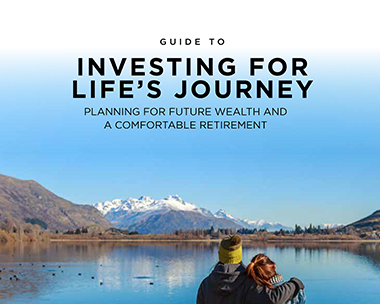Planning for future wealth and a comfortable retirement
Whatever age you are, wherever you are on life’s journey, it’s human nature to live in the moment and cope with whatever challenges life throws at you. Selecting the most appropriate investments to align with your values and life goals requires undertaking the right planning to accumulate wealth over the long term.
Your investment goals will change throughout the course of your life. And depending on which side of the coronavirus (COVID-19) financial equation you’ve been on, the last year has been possibly the strangest year ever for your investments.
We’ve experienced a stock market collapse, soaring unemployment, millions deferring their mortgage payments — and a booming housing market, plus bulging savings accounts.
Uncertainty and volatility in markets
But general economic factors, business conditions and political events are all part and parcel of investing throughout life’s journey. Over any given time period we can expect to see the economies go through a series of ups and downs leading to uncertainty and volatility in markets — which is why you need to take a long-term view.
It’s also important to remember that there is a big difference between saving and investing. Some investors may think of cash as a safe haven in volatile times, or even as a source of income. But in an era of low interest rates, the returns available on cash will be depressed to near zero, leaving cash savings vulnerable to erosion by inflation over time.
Long-term investment objectives
With interest rates expected to remain relatively low for the foreseeable future, you should be sure any sizeable allocation to cash does not undermine your long-term investment objectives. Some investors who leave cash on deposit may miss out on future performance that will have come from staying invested over the long term.
Of course, there are also reasons to invest conservatively — market volatility and preserving the funds you have, to name just a couple. But there is also a trade-off between risk and investment returns. Investing is a long-term activity. The more risk, the more potential return; the less risk, the less return potential.
Reinvesting income from investments
It’s ironic that minimising market risk can increase the probability of a long-term retirement income shortfall. With compound growth, even missing out on a few years can make an enormous difference to your eventual returns. Reinvesting income is another major factor. You can make even better use of the magic of compounding if you reinvest the income from your investments to boost your portfolio value further.
The difference between reinvesting, and not reinvesting, the income from your investments over the long term can be significant. Reinvesting income from your investments enables you to acquire more investments that will potentially grow in value and boost your overall returns. In simple terms, your returns also earn returns.
Top 12 tips for avoiding investment mistakes
- Neglecting to start or continue
- Failing to obtain professional advice
- Not having clear investment goals
- Failing to diversify enough
- Focusing on the wrong kind of performance
- Focusing too much on taxes
- Taking too much, too little, or the wrong risk
- Letting emotions get in the way
- Reacting to the media
- Trying to be a market timing genius
- Forgetting about inflation
- Not reviewing investments regularly
Entering a period of market correction
It’s important not to forget that volatility in financial markets is normal and you need to be prepared for the ups and downs of investing, rather than reacting emotionally when markets
enter a period of correction.
Market timing can be a dangerous approach. Pullbacks are hard to predict and strong returns often follow the worst returns. But some investors may think they can outsmart the market, or they let emotions push them into investment decisions they may later regret.
Desired returns while managing risk
While markets can always have a bad day, week, month or even a bad year, history suggests investors are much less likely to suffer losses over longer periods. Investors should aim to keep a long-term perspective. When it comes to creating an investment portfolio to help you maintain your quality of life during retirement, it’s essential that you diversify to help you achieve your desired returns while managing risk.
This means balancing the investments you have in your portfolio among different categories, classes and industries so that in a given economic situation they don’t all go up or go down together.
Maintaining a diversified portfolio
The term ‘correlation’ is used to describe how one type of investment behaves in relation to another. If two types of investments behave similarly, they are said to be positively correlated. If they behave differently, they’re negatively correlated.
So whether the market is bullish or bearish, maintaining a diversified portfolio is essential to any long-term investment strategy. A diversification strategy will help you achieve more consistent returns over time.
Looking to invest for a better future?
Given the high volatility we’ve seen in the markets recently and the current level of uncertainty regarding timescales for economic recovery from the pandemic, diversification will be a primary concern for many investors. Also, please seek professional advice before setting on investing, and beware of scammers.

